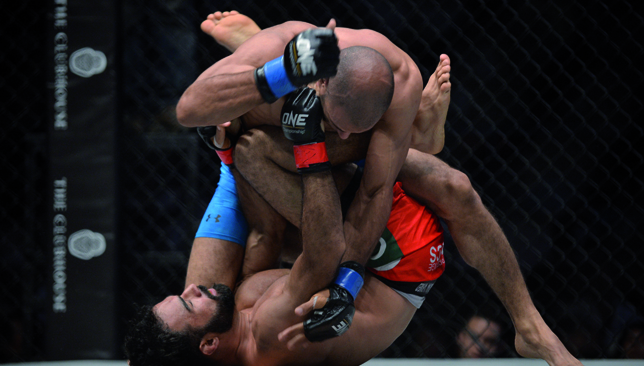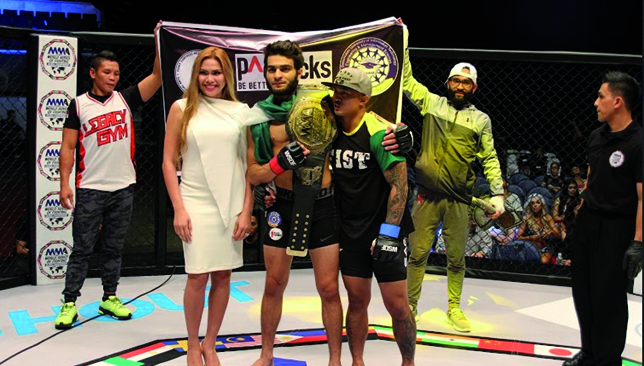
“I rented this small place above a nasty restaurant… I got it for $50 a month and nicknamed the place ‘The Slaughterhouse’ because it was so filthy.”
May, 2009. A former US Army medic stands in the centre of a dank and dirty apartment on top of an even dirtier restaurant with training mats made out of pieces of carpet. He has one goal in mind: to promote mixed martial arts in his country of birth.
Bashir Ahmad started his journey with practically nothing – just a cheap gym which doubled as an apartment, cheap equipment, a loyal sidekick and a big dream. As a Pakistani-American Muslim in the US Army, he felt out of place in the United States. But having lived most of his life in the States, his Urdu was rusty, making him feel just as out of place in Pakistan. Nonetheless, he set a goal and worked hard to make it a reality.
MMA was brought to Pakistan when a handful of children saw old PRIDE and UFC fights on the screen of a laptop which Bashir showed them. Word began to get around of a new style of JudoKarate, as locals called it, which was less ostentatious and more effective than anything they had seen before.
‘The Slaughterhouse’ was initially set up in Faisalabad, but soon moved to Lahore, where MMA would have a much wider audience.
“We sometimes trained by candlelight,” Bashir explains to Sport360. “We’ve trained by mobile phone light before. It was a case of ‘okay everyone, power’s gone out, get your mobiles on’. We’d put them all over the place and we’d keep on training.”
December, 2010. From an attic to a basement. The first official MMA gym, ‘Synergy MMA Academy’ opened in Pakistan, and was much better equipped than the Slaughterhouse. It had the bare essentials and willing students. There were no backflips, flying kicks or unnecessary shouting.
While this did not fall into line with the Jackie Chan movies which the Pakistani youth grew up watching, there were plenty of people interested in discovering what this ‘emm, emm, ey’ thing was all about. Word spread and Synergy MMA Academy, while still relatively unknown to the mass audience of Pakistan, garnered an underground following.
“I look back often to the early days,” says Bashir. “There was so much potential and so much room for imagination. In fact, I get even more nostalgic with every win and milestone we have because it always brings me back to the early days when we trained in the apartment and I would be talking to Afzal about what could happen with MMA in Pakistan. In fact, what would happen.”
Almost 400km away, in Pakistan’s capital of Islamabad, three brothers had set out on a journey of their own with a humbler goal than Bashir’s. They were Taekwondo black belts who simply wanted a place to train with others of similar interests.
Fight Fortress Islamabad, which had little to do with Synergy at the time was, and still is, the hub for Islamabad’s MMA scene; Uloomi Karim, Ali Sultan and Ehtisham Karim are considered pioneers of MMA in the country.
Eventually, Bashir found several other places across the country where talented martial artists were honing their skills, and he became acquainted with Team Fight Fortress. Both Shaheen and TFF still maintain excellent relations and a friendly rivalry and their unequivocal support, their tendency to take short notice fights irrespective of weight class or skill level and overall event management to this day is invaluable to the sport.
While networking with boxers and wrestlers and explaining what MMA actually is, Bashir founded Mixed Martial Arts Pakistan, an organisation designed to oversee all promotion of MMA in the country. With himself at the helm, he set out to make the sport a phenomenon in Pakistan.
With a slew of ever improving students, Bashir set up the first of many ‘Shaheen Smokers’ – amateur bouts pitting friendly fighters against one another as a test of skill. There was no bravado before or after fights, no antics, no trash talk or signs of disrespect. It was just content fighters who wanted to spar. Through these smokers, several gyms met for the first time and MMA began to pick up nationwide.

“The people who came to train, they are the real pioneers,” Bashir says. “Some people like to make a big issue of me being called the pioneer of MMA if that was a title that only one person can hold. No, everyone from those early days and even the people competing in these big shows now are all pioneers.”
Through various connections, PAK MMA hit a major stride when an independent fight promoter decided to host the first professional MMA event in Pakistan. With a guaranteed sponsor, Bashir organised the entire event.
From securing the venue, to the construction of the first ever eightsided cage in Pakistan, which the fighters dubbed the ‘Paktagon’, Bashir and his team of supportive students handled the event from the ground up. Pak Fight Club 1 took place in the middle of a soccer field at the Gaddafi Stadium in Lahore. There were no entry tickets, all you had to do was walk onto the field.
Fighters from all over the country showed up to compete, including Fight Fortress from Islamabad, Pakido from Gujar Khan and S3 from Karachi. The event was a massive success. With a strong fanbase and a growing reputation, PAK MMA was drawing attention to itself on an international level. However, it wasn’t until 2012 when the effort finally paid off and Bashir Ahmad was signed to ONE Championship, the premier mixed martial arts promotion in Asia.
On April 5, 2013, he stepped into the cage opposite Shannon Wiratchai with an entire country behind him. Being the first person to represent Pakistan in MMA on an international stage, Bashir Ahmad walked to the ring with tears in his eyes, and after 15 gruelling minutes, his hand was raised in victory. The fighters at Team Shaheen and all other gyms erupted.
With Bashir leading the way, Pakistan was developing a respectable reputation for talented fighters. Then the floodgates opened. Within a year, ONE signed another talented fighter and coach at Team Synergy, Waqar Umar. At the same time, TFF founder Uloomi Karim and top prospect Ahmad Mujtaba started making their names around the Thai and Filipino circuits.
Both Uloomi and Ahmad have now been signed to the World Series of Fighting Global roster and both now have bantamweight and featherweight championships under their belts – making them the first Pakistani MMA champions in history after both won on the same card and on the same night.
“PAK MMA has become an internationally recognised brand that is being used by us fighters nowadays to give show and portray positive image of Pakistan,” Uloomi tells Sport360. “Fight Fortress is the backbone of PAKMMA – fighters winning in WSOF and landing in ONE Championship has supplemented this idea.
“This is the most exciting sport in the world, it is the fastest growing sport in the world. Pakistanis love action, they love WWE and no one can deny the similarities between an MMA show and a WWE event and most of all they love winning and doing well internationally and that is what we are currently doing.”
From dirt-filled apartments to international coverage, MMA in Pakistan has come a long way. But what’s next? Could MMA possibly rival Pakistan’s most popular pastime?
“The goal is to make it the premier sport in Pakistan, possibly surpassing cricket,” Bashir says.“That might be a lofty vision but that’s how I see it.
“MMA can get even bigger but only if we keep the government away for as long as possible. They do a great job of ruining everything. They don’t place the most qualified people to run things, and certainly not the most passionate.
“If the government got involved in MMA there might be a quick boost and a few facilities and some trips abroad to amateur events and that would be where it would stay. It would never progress beyond that. It is the private sector and the work of the educated demographic of Pakistan who can make this sport enter the mainstream, enabling us to attract big sponsors and the big media.”
What PAK MMA has accomplished in a relatively short time given the corruption flooding every aspect of Pakistan – be it politics, media or sports – is commendable. People will be eternally grateful to the efforts of a few good men, all of whom had a love for fighting and a dream to drive them forward.